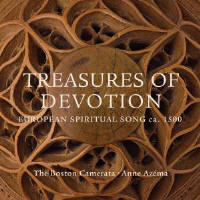Reviewer: James
V. Maiello
For several decades, under the
direction of Joel Cohen and more recently of Anne Azéma, the Boston Camerata
has been turning out albums that represent the best of early music
performance. Musically, the performances are remarkable in their virtuosity
and musical depth. Moreover, the programs are conceptually cohesive and
intellectually stimulating. The present recording is no exception, and a
welcome addition to a distinguished discography. Azéma and the ensemble
offer a program that uses the broad theme of “European spiritual song,” to
bring together some of the most significant threads of music and culture
around 1500, including the increasing importance of instrumental music and
the broadening demographic spectrum of those who consumed music in all its
various forms as performers, listeners, and devotional users. This is all
explained concisely and clearly in Azéma’s introductory note.
The famous chanson Fortuna desperata opens the program, first
interwoven with a litany of saints by and then in a setting by Agricola.
With Clemens non Papa’s Heere, lieve Heere, they form a devotional
triptych, supplications framing a sober reminder of death. This is an
ingenious bit of programming, and the performances are arresting. They are
restrained and gentle, but with a subtle sense of urgency that befits the
texts. The next five selections coalesce around a Marian theme, with
delicate instrumental versions of Ghizeghem’s De tous biens plaine
serving as a kind of refrain. Schlick’s Maria zart features Daniel
Hershey’s luminous tenor over an intimate lute intabulation that contrasts
the chorale-like vocal line. The set also includes an inspired reading
Josquin’s setting of De tous biens plaine.
A six-part
Christmas set focuses on Jean Daniel, using Certon’s J’ay le rebours
popular melodies, music by Pierre Moulu, and Daniel’s own music and texts.
In particular, this part of the program highlights for me the rise in
amateur music-making and popular devotion that took place in France and the
Low Countries. Among the highlights of this set are a joyful tutti
performance of Chantons de Noël and stunning purity of Azéma’s voice
and her graceful lines in Pêcheurs souffrez. A dignified reading
Senfl’s Ewiger Gott ushers in a Christological theme; Fabio Accurso’s
delicate performance of the lute intabulation introduces Compere’s motet
O bone Jesu. Two peformances of Tant que vivray show how the text
was reworked into a devotional song.
A haunting, unaccompanied vocal performance by Michael Barrett of the
anonymous song Het ghet in den oosten opens the final set, which
focuses mostly on music from German- and Dutch-speaking areas. Clemens non
Papa’s Als ick riep met verlanghen’s transformation from a love song
to a devotional one is reflected in the ensembles sober performance, while a
tender performance by Frederiksen (voice) and two lutes of Isaac’s famous
Lied Innsbruck, ich muß dich laßen is a standout here. Among
the other highlights, Josquin’s In te Domine speravi closes the
program, featuring the whole ensemble. Azéma’s interpretation, as one would
expect, is a wholly learned one. The light, slightly brisk performances
captures perfectly the subtle ways Josquin’s tries to show, musically, the
optimism of the text’s underlying meaning.
Simply put, Treasures of Devotion is in itself a treasure. The
program has been conceived carefully and brilliantly, with sets that are
cohesive in intelligent and inventive ways, all of which amplify a single
idea. The performances on the recording are exceptionally fine musically. As
with most early music, there is a great deal of room for improvisation and
interpretation, and the interpretive choices of the musicians play a more
integral role in performance than in later repertories. This disc is full of
informed, sophisticated, and tasteful choices, elevating the performances
from virtuosic to inspired. Treasures of Devotion reinforces the
Boston Camerata’s place as one of the best early music ensembles in the
world and Anne Azéma’s reputation as one of the most intelligent, creative,
and talented performers and directors not just of early music, but of any
repertoire.
Fermer la fenêtre/Close window |




